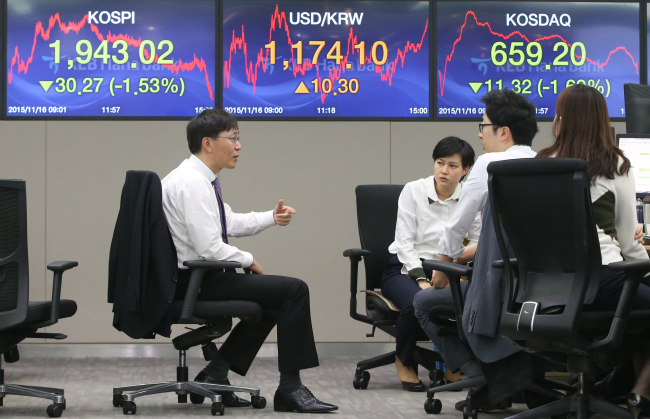The Korean bourse and currency were hit Monday due to a selloff by foreign investors after terrorist attacks in France over the weekend roiled Asian financial markets.
The Korea Composite Stock Price Index fell to the lowest in one and a half months, plummeting 1.53 percent, or 30.27 points, from the previous session to finish at 1,943.02.
The attacks in France are estimated to have accelerated the losing streak of the benchmark equity index, which was already bearish on expectations of a U.S. rate hike in December, analysts said.

Both foreign investors’ heavy net-selling and a plunge in tourism-related stocks led the drop. While small investors net purchased stocks worth 113.8 billion won ($97 million), foreigners offloaded 234.4 billion won worth. Institutions took a wait-and-see position.
The hardest-hit sectors included air carriers, tour agencies and hotels. Shares of Hotel Silla plunged by 13.3 percent to close at 89,300 won, Hana Tour by 8.94 percent to 112,000 won and Korea Air by 3.33 percent to 27,550 won.
Samsung Electronics’ shares fell below the 1.3 million won mark for the first time in about three weeks as it lost 2.85 percent from a session earlier to close at 1.263 million won.
The secondary KOSDAQ finished at 659.2, losing 1.69 percent or 11.32 points.
Meanwhile, the U.S. dollar gained 0.88 percent or 10.3 won to close at 1,174.1 won, as global currency analysts estimated that the attacks nudged investors toward safe assets.
After losing ground against the Korean won to stay below 1,130 won in mid-October, the greenback has continued to gain over the past month on the U.S. move toward a tighter monetary policy.
While the crisis in Paris further elevated the dollar’s exchange value, some local analysts cautiously issued the possibility that the U.S. Federal Reserve may choose to delay the base rate hike.
Kim Wi-dae, a researcher at the Korea Center for International Finance, cited global investment banks’ reports that most global market participants are predicting indexes to recover from the shock in the short term.
“Gradual recovery in indices is expected as in past cases,” Kim said. “But as some market participants (in the overseas market) issue the feasibility of a lingering situation involving the terror’s impact, there is a certain level of uncertainty, which could include additional terror attacks or retaliatory military actions.”
A large portion of local analysts also predicted a U.S. rate hike as expected during the Dec. 15-16 Federal Reserve policy gathering.
“Another key factor for the exchange rate direction is whether the Chinese yuan will be admitted into the International Monetary Fund’s Special Drawing Rights basket, (in the coming weeks)” said Yuanta Securities Korea analyst Park Se-jin.
By Kim Yon-se (kys@heraldcorp.com)












![[Today’s K-pop] BTS pop-up event to come to Seoul](http://res.heraldm.com/phpwas/restmb_idxmake.php?idx=644&simg=/content/image/2024/04/17/20240417050734_0.jpg&u=)




![[KH Explains] Hyundai's full hybrid edge to pay off amid slow transition to pure EVs](http://res.heraldm.com/phpwas/restmb_idxmake.php?idx=652&simg=/content/image/2024/04/18/20240418050645_0.jpg&u=20240419100350)

![[Today’s K-pop] Zico drops snippet of collaboration with Jennie](http://res.heraldm.com/phpwas/restmb_idxmake.php?idx=642&simg=/content/image/2024/04/18/20240418050702_0.jpg&u=)